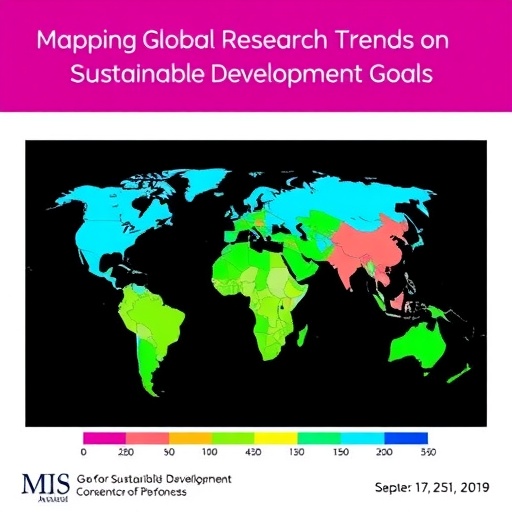In an illuminating exploration of the Sustainable Development Goals (SDGs), researchers have engaged in a comprehensive scientometric analysis that sheds light on the evolving landscape of global research pertaining to sustainability. The study, spearheaded by Emma Sharma and V.M. Bhimavarapu, maps the intricate pathways of scholarly work that have emerged in alignment with the SDGs. This exploration not only emphasizes the importance of sustainability in contemporary research but also highlights the dynamics of collaboration and thematic evolution that characterize this vital area of study.
The Sustainable Development Goals, adopted by all United Nations member states in 2015, represent a global commitment to achieving a better and more sustainable future for all by 2030. These 17 goals encompass a broad range of social, environmental, and economic challenges, including poverty, inequality, climate change, environmental degradation, peace, and justice. The meticulous analysis undertaken by Sharma and Bhimavarapu delves deep into the vast array of research output associated with these goals, offering valuable insights into the progress and challenges that lie ahead in pursuing sustainable development.
Utilizing advanced scientometric methods, the researchers meticulously collated a wealth of data from global scholarly publications. By employing quantitative techniques to analyze publication patterns, co-citation networks, and keyword occurrences, the study uncovers the pulse of scholarly engagement with sustainable development. This approach not only provides a clear picture of who is publishing but also illuminates the thematic trends that have emerged over time, revealing shifts in focus that correspond with global discourses on sustainability.
One striking finding from this research is the increasing international collaboration among scholars working on the SDGs. The study found a notable rise in co-authorship across borders, indicating a growing recognition of the collective responsibility to address sustainability challenges. This finding aligns with the idea that global issues require global solutions, and academic partnerships across nations plays a crucial role in driving innovative thoughts and actionable strategies for sustainability.
Moreover, the analysis identifies specific themes that have gained traction over the years. Issues such as climate action, responsible consumption, and quality education have emerged as focal points in recent research. The prioritization of these themes can be attributed to the mounting urgency of challenges such as climate change, which poses existential risks to humanity. Researchers have responded with a wealth of interdisciplinary studies that not only explore the direct impacts of these challenges but also offer potential pathways toward resilience and adaptation.
Another fascinating aspect of the study is the emergent focus on local and indigenous knowledge systems in sustainability research. As the implications of globalized solutions for sustainability become more apparent, there is a growing appreciation for the valuable insights that can be derived from localized practices and traditional ecological knowledge. The integration of these perspectives enriches scholarly discourse and highlights the importance of context-sensitive approaches in the pursuit of sustainability.
As scholars grapple with the complex interplay between human systems and the environment, the analysis reveals an evolving landscape of research methodologies. Innovative approaches, such as the use of big data and machine learning, are becoming increasingly prevalent in sustainability research. These technologies allow for more nuanced understanding of environmental challenges and enable researchers to model potential outcomes based on various scenarios, empowering decision-makers with data-driven insights.
Furthermore, the study emphasizes the need for policy-driven research to bridge the gap between academia and practice. While academic investigations illuminate theoretical frameworks and empirical data, there is a concurrent necessity to ensure that findings translate into actionable policies. This bridge between research and practice is essential for achieving the ambitious goals set forth in the SDGs and requires proactive engagement from researchers, policymakers, and practitioners alike.
The researchers also underscore the significance of socio-economic considerations in sustainability studies. As the effects of climate change disproportionately impact marginalized and vulnerable populations, it becomes imperative to integrate social equity into sustainability frameworks. The findings advocate for inclusive approaches that address the needs of diverse communities and ensure that the benefits of sustainable initiatives are equitably distributed.
In conclusion, the scientometric exploration conducted by Sharma and Bhimavarapu serves as a vital contribution to the ongoing discourse surrounding sustainable development. By illuminating trends in research output, collaboration, and thematic focus, the study provides a roadmap for scholars and practitioners as they navigate the complex terrain of sustainability. This research not only reflects the present landscape but also sets the stage for future explorations that will continue to shape our understanding and actions towards achieving the SDGs.
As the global community moves toward the 2030 deadline for the Sustainable Development Goals, the insights gleaned from this analysis are both timely and imperative. It reinforces the notion that sustainable development is not merely an ideal but a shared responsibility that demands collective action, innovative research, and inclusive strategies. The journey toward sustainability is ongoing, and through continued collaboration, scholarship, and a commitment to equitable practices, the vision articulated by the SDGs becomes increasingly attainable.
For all those engaged in the pursuit of sustainability, this study serves as a reminder of the power of academia to drive change and catalyze action. As knowledge evolves and new challenges emerge, the quest for sustainable solutions must remain at the forefront of global research efforts. With unwavering commitment and collective resolve, the promise of a more sustainable future can be realized.
Subject of Research: Sustainable Development Goals (SDGs)
Article Title: A scientometric exploration of global research and evolving themes on the sustainable development goals.
Article References:
Sharma, E., Bhimavarapu, V.M. A scientometric exploration of global research and evolving themes on the sustainable development goals.
Discov Sustain 6, 1304 (2025). https://doi.org/10.1007/s43621-025-02224-3
Image Credits: AI Generated
DOI: https://doi.org/10.1007/s43621-025-02224-3
Keywords: Sustainable Development, Research Trends, Global Collaboration, Climate Action, Policy Integration, Socio-economic Equity.




